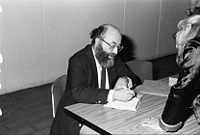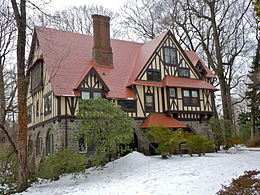- Chaim Potok
-
Chaim Potok 
Potok at the Miami Book Fair International of 1985Born Herman Harold Potok
February 17, 1929
The Bronx, New York CityDied July 23, 2002 (aged 73)
Merion, Pennsylvania, U.S.Occupation Novelist, Rabbi Nationality United States Genres Literary fiction Chaim Potok (February 17, 1929 – July 23, 2002) was an American Jewish author and rabbi. Potok is most famous for his first book The Chosen, a 1967 novel which was listed on The New York Times’ best seller list for 39 weeks and sold more than 3,400,000 copies.[1]
Contents
Biography
Herman Harold Potok was born in The Bronx, New York City, to Benjamin Max (died 1958) and Mollie (née Friedman) Potok (died 1985), Jewish immigrants from Poland. He was the oldest of four children, all of whom either became rabbis or married one. His Hebrew name was Chaim Tzvi (חיים צבי). He received an Orthodox Jewish education. After reading Evelyn Waugh's novel Brideshead Revisited as a teenager, he decided to become a writer (he often said that the novel Brideshead Revisited is what inspired his work and literature). He started writing fiction at the age of 16. At age 17 he made his first submission to the magazine The Atlantic Monthly. Although it wasn't published, he received a note from the editor complimenting his work.
In 1949, at the age of twenty, his stories were published in the literary magazine of Yeshiva University, which he also helped edit. In 1950, Potok graduated summa cum laude with a B.A. in English Literature.
After four years of study at the Jewish Theological Seminary of America he was ordained as a Conservative rabbi. He was appointed director of LTF, Leaders Training Fellowship, a youth organization affiliated with Conservative Judaism.
Potok met Adena Sara Mosevitzsky, a psychiatric social worker, at Camp Ramah in Ojai, California, where he served as camp director (1957–1959). They were married on June 8, 1958, and had three children.
After receiving a master's degree in Hebrew literature, Potok enlisted with the U.S. Army as a chaplain. He served in South Korea from 1955 to 1957. He described his time in South Korea as a transformative experience.[2] Brought up to believe that the Jewish people were central to history and God's plans, he experienced a region where there were almost no Jews and no anti-Semitism, yet whose religious believers prayed with the same fervor that he saw in Orthodox synagogues at home.
Upon his return, he joined the faculty of the University of Judaism in Los Angeles and became the director of a Conservative Jewish summer camp affiliated with the Conservative movement. A year later he began his graduate studies at the University of Pennsylvania and was appointed scholar-in-residence at Temple Har Zion in Philadelphia. In 1963, he spent a year in Israel, where he wrote his doctoral dissertation on Solomon Maimon and began to write a novel.
In 1964 Potok moved to Brooklyn. He became the managing editor of the magazine Conservative Judaism and joined the faculty of the Teachers’ Institute of the Jewish Theological Seminary. The following year, he was appointed editor-in-chief of the Jewish Publication Society in Philadelphia and later, chairman of the publication committee. Potok received a doctorate in philosophy from the University of Pennsylvania. In 1970, Potok relocated to Jerusalem with his family. He returned to Philadelphia in 1977. After the publication of Old Men At Midnight, he was diagnosed with brain cancer. He died at his home in Merion, Pennsylvania on July 23, 2002, aged 73.
Literary career
In 1967 Potok published his most critically praised novel, The Chosen, which won the Edward Lewis Wallant Prize and was nominated for the National Book Award. Potok wrote a sequel to The Chosen in 1969 entitled The Promise, which details the issues of the value and identity between Orthodox and Hasidic Jews. This book won the Athenaeum Literary Award the same year of its publication [3] Not long afterward the Jewish Publication Society appointed him as its special projects editor. In 1972, he published My Name is Asher Lev, the story of a boy struggling with his relationship with his parents, religion and his love of art. In 1975, he published In the Beginning. [4] From 1974 until his death, Potok served as a special projects editor for the Jewish Publication Society. During this time, Potok began translating the Hebrew Bible into English. In 1978 he published his non-fiction work, Wanderings: Chaim Potok’s Story of the Jews, a historical account of the Jews. Potok described his 1981 novel The Book of Lights as an account of his experiences in Asia during the war. He said “it reshaped the neat, coherent model of myself and my place in the world.”[citation needed]
His novel The Chosen was made into a film released in 1981, which won the most prestigious award at the World Film Festival, Montreal. Potok had a cameo role as a professor. The film featured Rod Steiger, Maximilian Schell and Robby Benson. It also became a short-lived Off-Broadway musical and was adapted subsequently as a stage play by Aaron Posner in collaboration with Potok, which premiered at the Arden Theatre Company in Philadelphia in 1999.
Potok’s 1985 novel Davita’s Harp is his only book featuring a female protagonist. In 1990, he published The Gift of Asher Lev, a the sequel to My Name is Asher Lev. Potok wrote many plays, among them Sins of The Father and Out of The Depths. In 1992 Potok completed another novel, I am the Clay, about the courageous struggle of a war-ravaged family. His 1993 young adult literature The Tree of Here was followed by two others, The Sky of Now(1995) and Zebra and Other Stories(1998).
Literary influences
Chaim Potok's parents discouraged his writing and reading of non-Jewish subjects. He spent many hours in the public library reading secular novels. Potok cited James Joyce, Thomas Mann, Fyodor Dostoevsky, Ernest Hemingway, and S.Y. Agnon as his chief literary influences. Many of his novels are set in the urban environments in New York in which he himself grew up.[5] While not Hasidic, Potok was raised in an extremely Orthodox home. In the book, Asher Lev wants to be a painter which causes much conflict with his father who wants him to do something else, much as Chaim Potok did during his childhood. Asher decides to continue as a painter and it disturbs his family, but Potok eventually decided to be an author and painted in his free time. Potok has said he relates to Asher Lev more than any of his other characters.[6]
Artistic career
Chaim Potok was also an artist. He recreated the painting "The Brooklyn Crucifixion", which the character Asher Lev painted in the book My Name is Asher Lev.[7]
Legacy
Chaim Potok has had a considerable influence on Jewish American authors.[8][9][10][11]His work was significant for discussing the conflict between the traditional aspects of Jewish thought and culture and modernity to a wider, non-Jewish culture."[citation needed]
He bequeathed his papers to the University of Pennsylvania[12] The university houses a collection of Potok correspondence, writings, lectures, sermons, article clippings, memorabilia and fan mail. One of his admirers was Elie Wiesel, who wrote to Potok saying he had read all his books “with fervor and friendship”. [13]
Published works
- Jewish Ethics (1964–69, 14 volumes)
- The Chosen (1967)
- The Promise (1969)
- My Name is Asher Lev (1972)
- In the Beginning (1975)
- The Jew Confronts Himself in American Literature (1975)
- Wanderings: Chaim Potok's History of the Jews (1978)
- The Book of Lights (1981)
- Davita's Harp (1985)
- Theo Tobiasse (1986)
- The Gift of Asher Lev (1990)
- I Am the Clay (1992)
- The Tree of Here (1993)
- The Sky of Now (1994)
- The Gates of November (1996)
- Zebra and Other Stories (1998)
- Isaac Stern: My First 79 Years (with Isaac Stern) (1999)
- Old Men at Midnight (2001)
- Conversations with Chaim Potok (edited by Daniel Walden) (2001)
See also
References
- ^ Chaim Potok: a critical companion, Sanford V. Sternlicht, p. 8. Greenwood Publishing Group, 2000
- ^ Chaim Potok: Wandering - The History of the Jews. Ballantine Books, 1983, Introduction
- ^ Athenaeum Literary Award, official website.
- ^ Philadelphia Atheneum
- ^ "Chaim Potok: Frequently Asked Questions". Potok.lasierra.edu. http://potok.lasierra.edu/Potok.faqs. Retrieved 2010-10-04.
- ^ "Chaim Potok: Interviews: Mars Hill Review". Potok.lasierra.edu. http://potok.lasierra.edu/Potok.interviews.MHR.html. Retrieved 2010-10-04.
- ^ "The Spectrum Blog: Art: Chaim Potok's "Brooklyn Crucifixion"". Spectrummagazine.typepad.com. 2006-07-02. http://spectrummagazine.typepad.com/the_spectrum_blog/2006/07/art_chaim_potok.html. Retrieved 2010-10-04.
- ^ "Chaim Potok". Jewishvirtuallibrary.org. 2002-07-23. http://www.jewishvirtuallibrary.org/jsource/biography/Potok.html. Retrieved 2010-10-04.
- ^ "Biography of Chaim Potok | List of Works, Study Guides & Essays". GradeSaver. http://www.gradesaver.com/author/chaim-potok. Retrieved 2010-10-04.
- ^ [1][dead link]
- ^ Great American Writers;Twentieth Century
- ^ See Arts, Briefly compiled by Julie Bloom. Papers of Chaim Potok To Go to Penn, The New York Times, Monday, January 18, 2010, p. C2.
- ^ Penn Libraries Receive Chaim Potok Papers
External links
- Chaim Potok resource site created by William M. Allen, PhD, La Sierra University
- Chaim Potok at the Open Directory Project
Categories:- 1929 births
- 2002 deaths
- American people of Polish-Jewish descent
- American Conservative rabbis
- American novelists
- Deaths from brain cancer
- University of Pennsylvania alumni
- Yeshiva University alumni
- Jewish Theological Seminary of America semikhah recipients
- 20th-century rabbis
- Translators of the Bible into English
- Cancer deaths in Pennsylvania
- Rabbis in the military
- Jewish American novelists
- Postmodern writers
Wikimedia Foundation. 2010.

